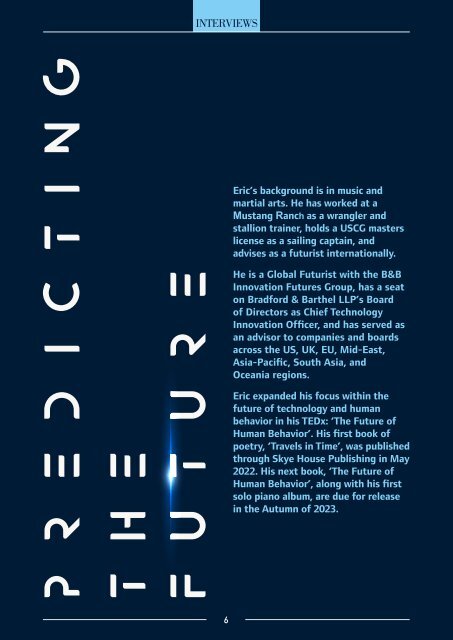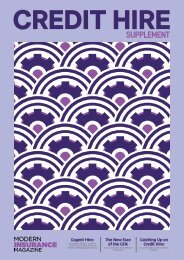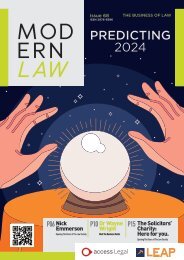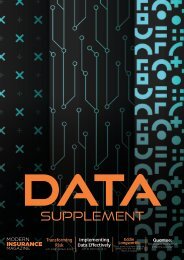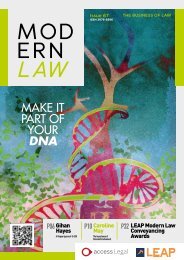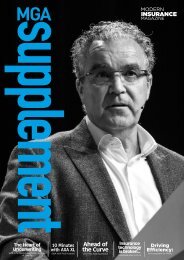Modern Law Magazine Issue 65
Interview: ‘Looking to the Future’, Eric Hunter. Interview: ‘Innovation Through Collaboration’, Electra Japonas. Interview: ‘The Intersection of A.I. and Law’, Raymond Sun. A Chat With… Ethan French, Iceberg. A Chat With… Peter Ross, Report Factory Insight: ‘Embracing Technology’, Savvas Skordellis, Deloitte. Insight: ‘Can We SustAIn It?’, Mercy Chirau, Womble Bond Dickson. Insight: ‘Collaborating On a Global Level’, Claudio Palmeri, PEXA. Insight: ‘Revolutionising the Legal Landscape’, Natasha Lewis, Duncan Lewis and YAO. Editorial Board of industry experts and thought leaders Feature: ‘From Memes to Hashtags: Why Lawyers Should Be Embracing Social Media’, Charlotte Lord. Feature: ‘Technology to Drive Sales for Law Firms’, Hannah Ajikawo. Feature: ‘LegalTech, Pricing Pressure and Emerging Technologies’, Lauren Watson Private Client Awards Personal Injury Roundtable Conference: Bold Legal Summer Conference 2023 Conveyancing Forum 10 Mins With… Hannah Ford.
Interview: ‘Looking to the Future’, Eric Hunter.
Interview: ‘Innovation Through Collaboration’, Electra Japonas.
Interview: ‘The Intersection of A.I. and Law’, Raymond Sun.
A Chat With… Ethan French, Iceberg.
A Chat With… Peter Ross, Report Factory
Insight: ‘Embracing Technology’, Savvas Skordellis, Deloitte.
Insight: ‘Can We SustAIn It?’, Mercy Chirau, Womble Bond Dickson.
Insight: ‘Collaborating On a Global Level’, Claudio Palmeri, PEXA.
Insight: ‘Revolutionising the Legal Landscape’, Natasha Lewis, Duncan Lewis and YAO.
Editorial Board of industry experts and thought leaders
Feature: ‘From Memes to Hashtags: Why Lawyers Should Be Embracing Social Media’, Charlotte Lord.
Feature: ‘Technology to Drive Sales for Law Firms’, Hannah Ajikawo.
Feature: ‘LegalTech, Pricing Pressure and Emerging Technologies’, Lauren Watson
Private Client Awards
Personal Injury Roundtable
Conference: Bold Legal Summer Conference 2023
Conveyancing Forum
10 Mins With… Hannah Ford.
You also want an ePaper? Increase the reach of your titles
YUMPU automatically turns print PDFs into web optimized ePapers that Google loves.
INTERVIEWS<br />
INTERVIEWS<br />
Eric’s background is in music and<br />
martial arts. He has worked at a<br />
Mustang Ranch as a wrangler and<br />
stallion trainer, holds a USCG masters<br />
license as a sailing captain, and<br />
advises as a futurist internationally.<br />
He is a Global Futurist with the B&B<br />
Innovation Futures Group, has a seat<br />
on Bradford & Barthel LLP’s Board<br />
of Directors as Chief Technology<br />
Innovation Officer, and has served as<br />
an advisor to companies and boards<br />
across the US, UK, EU, Mid-East,<br />
Asia-Pacific, South Asia, and<br />
Oceania regions.<br />
Eric expanded his focus within the<br />
future of technology and human<br />
behavior in his TEDx: ‘The Future of<br />
Human Behavior’. His first book of<br />
poetry, ‘Travels in Time’, was published<br />
through Skye House Publishing in May<br />
2022. His next book, ‘The Future of<br />
Human Behavior’, along with his first<br />
solo piano album, are due for release<br />
in the Autumn of 2023.<br />
As a futurist, how do you<br />
incorporate an understanding<br />
of human behaviour into your<br />
predictions and analysis of the<br />
legal landscape?<br />
We’re in an era of perception-based<br />
technology evolution. As a stroke<br />
survivor, I often form parallels between<br />
rebuilding sensory input that we often<br />
take for granted, and placing this into a<br />
context of an artificial intelligence neural<br />
net build. As Nvidia recently disclosed at<br />
the ISC Conference in Hamburg, while AI<br />
was a key piece in building their neural<br />
net within their digital twin modeling of<br />
earth, they didn’t fully understand how<br />
their AI actually built their neural net.<br />
And yet, it worked.<br />
While Nvidia discussed their reverse<br />
engineering approach within this neural<br />
net build in order to fully understand their<br />
AI’s approach, we have yet to fully do the<br />
same with the human brain.<br />
In your opinion, what are some<br />
key psychological factors that<br />
influence human decisionmaking<br />
in legal matters? How<br />
can legal professionals leverage<br />
this knowledge to better serve<br />
their clients?<br />
Focusing still on the human brain, there<br />
is an incredible explosive time in learning<br />
that takes place within human beings<br />
from the ages of 0 to 5, 6 or 7 depending<br />
on the research one references.<br />
In addition to an incremental approach<br />
in learning, there are explosive<br />
understandings that take place in<br />
language development and awareness.<br />
If there’s a primary time to learn multiple<br />
languages, it is currently during this<br />
timeframe of brain evolution.<br />
I’ll often state when speaking to<br />
audiences, that we both shape and are<br />
shaped by our reality.<br />
Realising that our awareness within the<br />
reality around us is constantly evolving,<br />
while both ourselves and our reality are<br />
evolving at the same time, is something<br />
that is important for us to remember. We<br />
often take certain perceptions for granted,<br />
both within ourselves and in what we<br />
interpret around us.<br />
‘Litigation heavy practice areas rely on human<br />
to human interaction.’<br />
‘We’re in an era of perception-based technology<br />
evolution. As a stroke survivor, I often form<br />
parallels between rebuilding sensory input that<br />
we often take for granted.’<br />
As we learned during the pandemic, how<br />
we perceive the world is often how we<br />
shape the world.<br />
Locked down for long periods of time<br />
while experiencing the world through<br />
two dimensional screens shaped our<br />
perception during that time. Leaving<br />
lockdown and experiencing full sensory<br />
immersion outside, and in both new and<br />
remembered environments, reshaped our<br />
perceptions further. It’s a particular time in<br />
history when we as humans the globe over<br />
had nearly an entire globe experiencing<br />
similar shifts in perception, in how we<br />
view the world, and how our immediate<br />
environmental reality shapes us.<br />
This of course, translates to the workplace<br />
and those we interact with, both in<br />
their personal environments and in their<br />
workplace environments. Now more<br />
than ever, these environments have the<br />
opportunity to merge.<br />
In the legal world, particularly as the legal<br />
industry and their clients begin to integrate<br />
large language model and generative<br />
AI into practice areas, practice specific<br />
relationships and applications, it’s an<br />
important element to remember.<br />
How do you see human behaviour<br />
changing in the context of<br />
emerging technologies and their<br />
impact on the legal system? Are<br />
there any particular behavioural<br />
shifts that you anticipate?<br />
Behavioural shifts have already begun<br />
to take place. The use cases for Large<br />
Language Model AI have entered public<br />
consciousness through Open AI Chat<br />
GPT’s viral feats in the fall of 2022 and<br />
continuing into 2023.<br />
Understanding and awareness of practice<br />
areas that are more prone to automation,<br />
while leaning into practice areas that are<br />
litigation heavy and rely heavily on human<br />
interaction is a key evolution taking place.<br />
As we begin to see more spatial<br />
computing, augmented and virtual<br />
reality integration take place in<br />
depositions, court rooms, and for trial<br />
evidence, new horizons open up for the<br />
legal world.<br />
What trends or developments<br />
do you foresee in the legal<br />
industry over the next decade?<br />
AI, Spatial Compute (Augmented/Virtual<br />
Reality) and Quantum Computing.<br />
1. Let’s start with AI.<br />
Large Language Model AI integration<br />
by practice area is a key element already<br />
underway. Though chip shortages in<br />
GPU level supercompute builds have<br />
created a temporary gap in technology<br />
innovation specific to the legal industry,<br />
investments and innovations are<br />
currently underway. Currently, Large<br />
Language Model AI requires scale and<br />
the proper GPU configuration on the<br />
supercompute side to train the AI from<br />
incremental to exponential learning.<br />
Essentially, beginning the correct<br />
supercompute build at scale equals the<br />
pathway to Large Language Model AI<br />
exponential learning and development,<br />
similar to how I described brain<br />
development earlier.<br />
Once trained however, it is important<br />
to shift from as much data as possible<br />
through the AI build to a more refined<br />
approach relative to the desired focus<br />
area required to reduce noise and<br />
develop targeted accuracy.<br />
While LexisNexis and others have already<br />
moved forward in their Large Language<br />
Model builds, many other technology<br />
players within the Legal Industry have<br />
yet to catch up, particularly with practice<br />
specific builds.<br />
It’s important to note, the correct<br />
supercompute build specific to Large<br />
Language Model AI can currently take<br />
place in months. For an incorrect build<br />
however, it will take years. Therefore,<br />
the particular type of supercompute<br />
build and structure to achieve scale<br />
cannot be overlooked.<br />
6<br />
7


